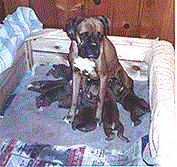 Buying A Boxer Puppy
Buying A Boxer Puppy

Locating a Breeder
Your local dog show is the best source---and is one of the purposes of such shows. Boxer magazines publish ads from breeders. The American Kennel Club's AKC Gazette (often available at larger newsstands) lists the secretaries of the national breed clubs who, in turn, can direct you to local sources. Or visit our Breeder Referral page.
At What Age Should I Buy My Puppy?
Usually any time after 7-8 weeks. Many states have regulations regarding minimum age. However, your individual circumstances must be considered. Do you have the time to spend with a very young puppy? Will someone be home to housebreak him? Would an exuberant 6-month old puppy overwhelm a tiny child? Or would he be better matched with a 6-year-old youngster? Remember also that the puppy under 3 months needs lots of time to rest.
While much can be told at six to eight weeks about the puppy's eventual looks, if you are seeking a show prospect you might be better off waiting until the pup is six to eight months of age. At that time, be prepared to pay a higher price for all the additional time and effort that the breeder has spent raising the show potential Boxer.
Male or Female?
This choice is a matter of personal preference. Remember, however, that if you contemplate breeding, you will need to start with the very best quality female you can find. Females make admirable pets. If breeding is not anticipated, you will want to spay your female. This operation should be done after consulting your veterinarian, and probably before the puppy is a year old. This will effectively prevent your female from coming into season and attracting male dogs from miles around!
Check this list!
1. Tails should have been docked within a few days of birth.
2. Optional removal of front dewclaws (fifth toes) done at the same time The Boxer has no rear dewclaws.
3. Ear cropping is appropriate for the well-being of the breed. This procedure is done under general anesthesia, usually between six and nine weeks of age. If the puppy is taken before cropping, the breeder usually makes arrangements. Breeder also advises regarding aftercare and taping if ears are not already standing. Sometimes this is a lengthy process. The erect, cropped ear reduces the potential for infections and hematomas that often beset long-eared breeds.
4. In the male, both testicles should be descended into the scrotum. They should be in place by two to three months of age. A dog with undescended testicles may still make a fine pet, though he would be ineligible to compete in the show ring. Consult your vetennarian for advice.
5. Avoid the unusually quiet, inactive puppy, or the one that might shy away from you. This might mean a fault in temperament or even ill health.
6. Do not be fooled by advertisements or backyard breeders offering "rare" white boxers or one with predominantly white background color (they are anything but rare). Reputable breeders place white boxers in good homes at minimal or sometimes no cost.
7. Papers the Seller Should Furnish:
--a. A three- or four-generation pedigree signed by the seller. This usually represents the bill of sale. There should be no charge for this. The pedigree preferably gives the color of the sire and dam, and the AKC registration numbers of each.
--b. The AKC Registration Form, which is an official document identifying your puppy's litter registration number, sex, birth date, sire and dam, and name of the breeder(s). There are two ways to register puppies for the first time with this blueslip:
----- (1) Limited Registration
If the puppy is not to be bred, or is not considered sound, and is being purchased only as a companion pet, the breeder may check off the Limited Registration option. This does register the puppy with the AKC. However, it does not allow any registration of offspring from the mature dog. The breeder (and only the breeder) can cancel the limited registration should the puppy at maturity be considered of breeding quality.
----- (2) Full Registration
If the puppy is considered to be of breeding quality, the seller will check off the full registration option.
8. Records the Breeder Should Furnish:
--a. Date and type of vaccines given. Depending on the type of vaccination program started, your veterinarian will advise you on following through. Remember, too, that so-called permanent shots still require a yearly booster.
--b. Date and agent used for worming, if done. Do not worm your puppy without consulting your veterinarian. Avoid "store-bought" preparations.
--c. Diet your puppy has been receiving. It is well to maintain the regimen begun by the breeder, especially while the puppy is adjusting to his new home. If changes are to be made. do so very gradually, so as not to upset his system When he is an adult it will be wise to maintain your Boxer on two smaller meals a day, and to restrict exercise immediately after eating, so as to lesson the likelihood of bloat (or gastric torsion).
